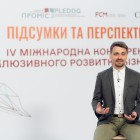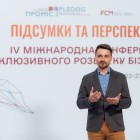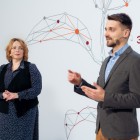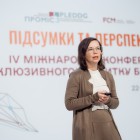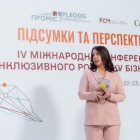On December 22 and 23, PLEDDG’s IV International Online Conference on Inclusive Business Development took place. Social entrepreneurship practitioners, government officials, and leading Ukrainian and Canadian experts came together for the fourth time to discuss the current state and key trends in social entrepreneurship in Ukraine.
Among the main topics of this year’s Conference are the importance of supporting women’s entrepreneurship, the benefits of an inclusive approach to doing business, and an overview of the opportunities and threats posed by the coronavirus crisis.
The first panel discussion “Inclusion — a standard of social values” was devoted to a review of best practices of social business in Ukraine. Entrepreneurs shared their experience in implementing the principles of inclusiveness, the specifics of building partnerships, and the positive impact of the social orientation of the enterprise on community life.
Experts and representatives of local self-government bodies shared the tools and practices currently available to local governments to support the development of inclusive business during the second panel discussion “Local self-government as a driver of inclusive and social business development”. New opportunities for municipalities, created by several reforms in Ukraine, are already being implemented on the ground and are becoming a good basis for ensuring the sustainability of socially oriented enterprises. To date, all partner cities have developed SME support programs, and Vinnytsia and Ivano-Frankivsk have created and adopted social entrepreneurship development programs, thus initiating movement towards a social standard of local business responsibility.
In his welcoming speech, PLEDDG Director Oleksandr Kucherenko said:
During the panel discussion, Vitalii Bokhniak, Senior Expert in Business Development at PLEDDG, presented the results of the express analysis of the business climate of PLEDDG’s partner cities.
The discussion on the second day of the event was dedicated to the online conference “Women’s Entrepreneurship as a Component of Economic Development”, which tackled the issues of women’s involvement in business. The speakers shared their experience in organizing a business accelerator for women entrepreneurs, organizing mentoring assistance from experienced business owners, and supporting women’s entrepreneurial initiatives in small communities.
One of the participants of the conference Lada Malaniy, head of the project Accelerator of Creative Women’s Startups from Ivano-Frankivsk noted that thanks to the assistance of the PLEDDG’s experts, the idea of the Accelerator has reached an entirely new level, with the project turning into a mentorship assistance network and, today, uniting women-entrepreneurs from all over Ukraine.
During the fourth panel discussion “Business and Inclusion: Threats and Opportunities in a Crisis”, owners of socially-oriented businesses discussed how they adapt their enterprises to the crisis caused by the pandemic.
As a panelist, Kent McMullin, Senior Business Strategist at the Economic Sustainability Department within the City of Edmonton, Canada, commented:
Inclusion is an advantage — the final conclusion of the conference’s experts perfectly describes the opportunities opened by this democratic principle for the business. It gives entrepreneurial initiatives the ability to be more adaptive, to contribute to society, influence the development of the city, and motivate the society to change for the better.
Over its 5 years of activity, PLEDDG has supported more than 40 initiatives of NGOs and SMEs aimed at the development of inclusive business. PLEDDG particularly appreciates that all partner cities consistently support broad access to work and self-fulfillment for all groups of the population, and make efforts to grow and strengthen small and medium-sized enterprises with a focus on women entrepreneurs. The results of the international conference, which for the fourth time has brought together practitioners of inclusive business development, demonstrate the effectiveness of the chosen path of urban economic growth on the principles of sustainable development and social value.



